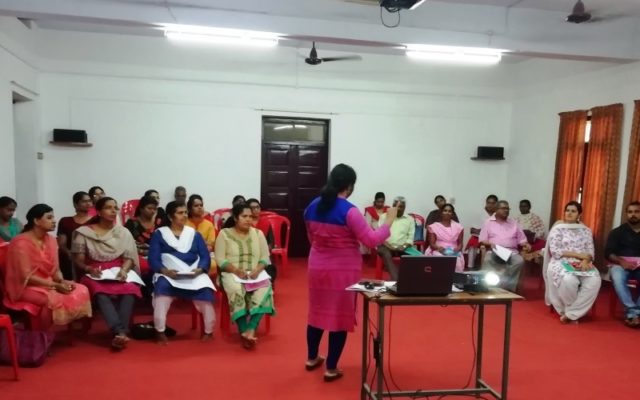As part of the policy making and framing the child protection systems for each Don Bosco Institutions in Kerala and Karnataka, the child safety enhancement training for the Child Protection Committee Members were organised from 5th to 8th March 2019 at Don Bosco Vaduthala, Kerala. The resource person for the training was Ms. Edwina Pereira, Child First Foundation, Bangalore. BREADS has facilitated the implementation of Child protection policy and establishment of the system for child protection in all the Don Bosco centres at Kerala and Karnataka. On 5th and 6th of March the training was mainly for those institutions such as child care, church, social work centres etc. other than schools. There were 12 Child protection committee members who have participated in the training during the first batch. On the 7th and 8th of March the workshop was conducted mainly for the Don Bosco schools in Kerala and 37 members participated in the training.
Protection/safety of a child is integrally linked to all the other rights of the child. The Indian Constitution guarantees children equal rights and equality before law. In spite of the prevalence of law and policies, the vulnerability of children is a risk factor, endangering the safety and complete assurance of protection of children from abuses and exploitations of its various kinds. The reinforcement of law and the current scenario is calling the intense need for the establishment of a child protection system at the Don Bosco institutions whether committed to child care services, education or social impact. The zeal to ensure protection of every child associated with DB institutions is leading this initiative. The training incorporated introduction to the UNCRC (United Nations Convention on the Rights of the Child), JJA (Juvenile Justice Act) and POCSO 2012 (The Protection of Children from Sexual Offences Act). The participants were briefly described to the four types of abuses which the children are generally vulnerable to and the four pillar approach all child protection committee members must use to enhance the safety and protection of children. The components of the child protection policy were explained one by one and the steps to implementing the policy at their respective organisations in consonance to the children’s areas of risk. The training was made effective through case study discussions, group activities, group discussions and games which helped the members to perceive and comprehend the situations from child’s point of view and thus to make more intense and impactful decisions while a child disclose an abuse. The participants were distributed with the resource materials and handbooks for their future reference. At the end of the sessions, the groups from each organization prepared an action plan to implement the CPP in their respective institutes acknowledging the hazards/vulnerabilities confronted by children in their physical environment. The child protection policy is to be implemented with effect from the new academic year 2019, June.





